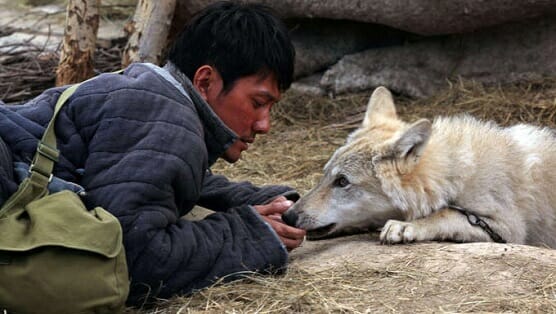
French director Jean-Jacques Annaud (The Bear, Seven Years in Tibet, Two Brothers) again investigates the bonds between man and both his environment and animals with Wolf Totem, a film that also allows him to indulge in his usual brand of overwrought melodrama. Based on a 2004 semi-autobiographical novel by Lu Jiamin, this Chinese production is at its best when immersing itself in its Inner Mongolian milieu, a place of vast plains and enormous sky, where illumination is provided by only the sun and fire, and the clouds hover over the region’s inhabitants like a protective cover. Annaud captures the beauty of his setting in widescreen panoramas that evoke a world still unspoiled by modernity—albeit not for long. The 1969 arrival of two students to this harsh area spells the end of the old and the dawn of the new.
The visitors have been sent from Beijing by Mao’s Communist Party to teach the Mongolian shepherds how to read and write (and, presumably, to prepare for the extinction of their lifestyle). However, one of them, Chen Zhen (Feng Shaofeng), immediately takes to his rural environs—and in particular, to the feral wolves roaming the land. The camp’s elder, Bilig (Basen Zhabu), explains to Chen about the wolves’ nobility, and their vital role in Inner Mongolia’s fragile ecosystem, which demands that the wolves routinely hunt gazelles (or they’ll consume too much precious grass) and maintain their numbers, lest the rest of the wild animals procreate to unreasonable, crop-destroying levels. It’s a vicious circle of life, and much of the ensuing story derives its drama from those seeking to overturn the province’s age-old paradigms.
Those disruptive forces come in the form of human villains who steal the wolves’ winter supply of gazelles—thus compelling the wolves to hunt the Mongolians’ horses and sheep—and from the Communist Party’s local leader, who soon calls for the extermination of the increasingly bold wolf herds. Complicating matters further is Chen, who aims to capture and keep a cub in order to study it. While Chen’s motives for doing this are, in the abstract, pure, Wolf Totem at least partially condemns its protagonist for his actions, given they fly in the face of both na that(wolves aren’t meant to be domesticated) and, just as importantly, the camp’s best interests. Soon, Chen’s pet is attracting the hazardous attention of the rest of the area’s wolves, as well as attacking some of Chen’s friends, including the son of a woman he hopes to woo.
Consequently, Wolf Totem paints domestication as a potentially worse course of action, in this case, than murder, which the Mongolians do to cubs—by literally throwing them into the air—for security, religious and practical fur-collecting reasons. Yet despite its ethnographic interest in the various factors governing Mongolian survival, it’s also concerned with melodrama of a highly creaky, scattered sort. Annaud’s script (co-written with Alain Godard, John Collee and Lu Wei) favors Very Important Speeches over natural dialogue, and its narrative twists are often driven by characters behaving in overly cartoonish good/bad/foolish ways. There’s a persistent sense that Annaud wants every scene to be a momentous one, and the result is that most come across as labored. The same holds true of his cast’s performances, which are rendered one-dimensional by a story that rarely delves into the underlying motivations behind its many players’ behavior.
Nonetheless, if it strives too hard for weighty import, Wolf Totem remains an occasionally stirring portrait of Mongolia’s wolf population. Employing animals he trained specifically for the production, Annaud delivers a series of gorgeously wrought tableaus involving the wolves warily eyeing their human compatriots from afar, or patiently stalking their prey, their hungry mouths dripping with drool. In those moments, one can sense their canniness, their ferocity, and their will to persevere no matter their increasingly dire circumstances. In the end, such qualities resound far more than the film’s strained and corny attempts to mythologize them as divine beasts, and to revel in their supposedly intrinsic, inspiring bond with mankind.
Director: Jean-Jacques Annaud
Writers: Jean-Jacques Annaud, Alain Godard, John Collee, Lu Wei
Starring: Feng Shaofeng, Shawn Dou, Ankhnyam Ragchaa, Basen Zhabu
Release Date: September 11, 2015